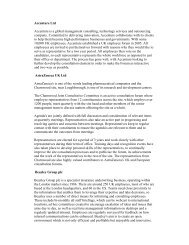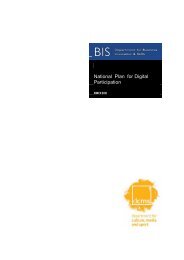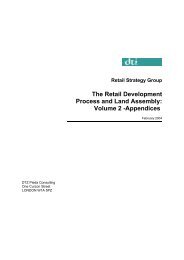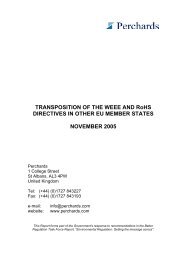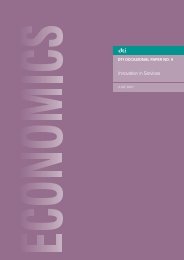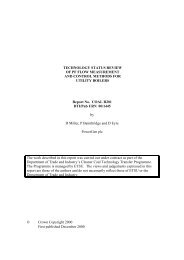Public Policy: Using Market-Based Approaches - Department for ...
Public Policy: Using Market-Based Approaches - Department for ...
Public Policy: Using Market-Based Approaches - Department for ...
Create successful ePaper yourself
Turn your PDF publications into a flip-book with our unique Google optimized e-Paper software.
<strong>Public</strong> <strong>Policy</strong>: <strong>Using</strong> <strong>Market</strong>-<strong>Based</strong> <strong>Approaches</strong><br />
<strong>Market</strong>able permit schemes share many features with environmental taxes.<br />
However, there are two main differences: 57<br />
a. taxes fix the value assigned to pollution but leave the quantity undetermined,<br />
while trading schemes fix the quantity and leave the value to be determined<br />
by the market; and<br />
b. the distributional consequences can vary depending how permits <strong>for</strong> trading<br />
schemes are allocated.<br />
In cases where there is a choice between using a tax or tradable permit scheme,<br />
the choice between the two options will depend on the goal of the policy to be<br />
implemented and a cost-benefit analysis of each option. In other words and as<br />
stated by HM Treasury: 58<br />
a. Is it essential to bring pollution down to a set quantity or is it the aim to<br />
internalise the known externality?<br />
In the <strong>for</strong>mer case a tradable permit scheme may be preferred, in the latter a<br />
per unit tax.<br />
b. What is the relationship between the marginal benefits of reducing emissions<br />
and the marginal cost of abatement?<br />
If this relationship is very uncertain, a tradable permit scheme may be<br />
preferred, as it allows the price to be determined by the market. A per unit tax<br />
could result in too great or too low a level of pollution abatement.<br />
c. Can a trading scheme be implemented at a reasonable cost and is there likely<br />
to be a well-functioning market in permits?<br />
If the answer is no, a marketable permits scheme is unlikely to given an<br />
optimal result.<br />
IMPLEMENTATION ISSUES<br />
Economic theory and studies of past experience suggest that the following<br />
implementation issues can affect the success of taxes and subsidies:<br />
● existing market failures;<br />
● measurement of emissions;<br />
● determining the appropriate tax rate; and<br />
● problems specific to subsidies<br />
The evidence on these issues which we have examined is set out in Part V. Below<br />
we summarise the main conclusions we have drawn from this evidence.<br />
57 Cabinet Office (2002), The Energy Review, available at<br />
http://www.number-10.gov.uk/su/energy/TheEnergyReview.PDF.<br />
58 HM Treasury (November 2002) Tax and the environment: using economic instruments, available at:<br />
http://www.hm-treasury.gov.uk/media/D54/07/adtaxenviron02-332kb.pdf.<br />
64




